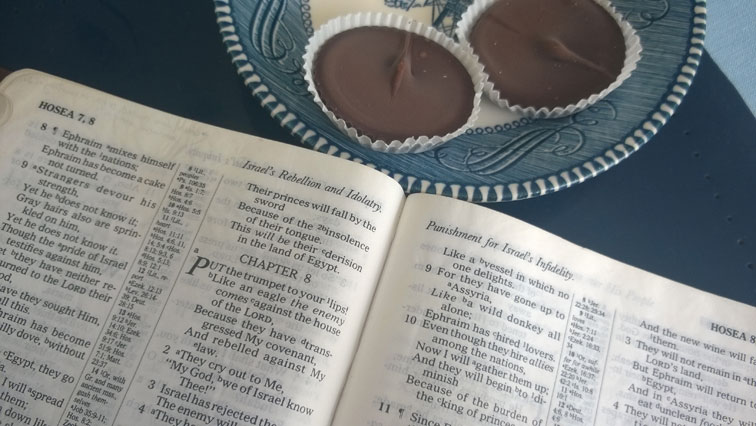
Today’s Chocolate: Justin’s Dark Chocolate Peanut Butter Cups
Today’s Passage: Hosea 8
There’s a saying from the French Revolution: “”Men will never be free until the last king is strangled with the entrails of the last priest.” It occurred to me: there are periods in history where I think God might actually agree with that statement. For example, consider Hosea’s Israel.
In Hosea’s day, Israel had a leadership problem. Evil rulers led the nation, and evil people put them into power. God accuses the populace: “They have set up kings, but not by Me; they have appointed princes, but I did not know it” (4). Compare that to Hosea 7:5 and 7:7, where the rulers overindulge themselves with wine on festival days, and the populace figuratively burns up those who are ostensibly in power over them. It’s a case of the tail wagging the dog, the cart coming before the horse, the blind leading the blind, and other overused metaphors.
Israel has a history of picking bad kings. From the outset, God gave them their monarchy as a concession, and he warned them that they’d come to regret it (1 Samuel 8:4-22). The people wanted a king who would serve their desires, but flawed human kings would inevitably leverage their power to make the people serve the monarchy. In the narrative, though, God suggests that only he is adequate to serve as Israel’s king. I can’t help but wonder: is Israel’s fault in Hosea’s day that they’ve strayed from the tradition of anointing, instituting kings chosen by God through his prophets? Or, given their track record, are kings just a bad idea in general?
So much, then, for kings. But what of priests? We see that Israel’s problems are not just political, but religious; they’ve taken to idolatry. In the same breath as his criticism of poorly-appointed kings, Hosea tells us, “With their silver and gold they have made idols for themselves, that they might be cut off” (4). They use precious metals to make effigies and false gods, devaluing the metal through useless purposes. Hosea criticizes the idol of the “calf of Samaria,” observing, “A craftsman made it, so it is not God” (6). Idols are inferior deities; both the physical statues and the gods they represent are man-made, mere images and concepts, with no divinity to call their own. Contrast that with the uncreated Creator, who is not just the only king worthy of the position but also the only deity worthy of worship.
Here, Hosea reiterates his point that Israel’s political and religious evils are forms of spiritual adultery. “They are now among the nations like a vessel in which no one delights…Ephraim has hired lovers” (8-9), Hosea writes, exposing how the nation has cheapened itself. Israel was supposed to stand out as a nation of God’s chosen people; but with its internal turmoil, self-effacing idolatry, and political alliances of fawning subservience, it’s become like every other kingdom. The people may say, “My God, we of Israel know You!” (2), but even when they offer sacrifices on the altar, they’ve turned it into an altar of sin. The empty and unrepentant gesture fails to put them back in God’s good graces (11, 13). The whole system’s gone rotten; hang the princes with the guts of the priests.
In a single succinct statement at the end of the chapter, Hosea identifies the root of the problem: “Israel has forgotten his Maker” (14). And I would say that I wonder if we have the same problem today in America, but I don’t really wonder much at all. We cry out to him, “My God, we of America know you!” And I imagine him saying: pfft.
“Or, given their track record, are kings just a bad idea in general? …what of priests? … they’ve taken to idolatry.”
Yes, having a king (or president or prime minister) is a bad idea in general, *because* it is idolatry. They were to have no king but God Himself. By choosing a king, they were rejecting God. It’s no wonder that they literally took to idolatry as well.
“the uncreated Creator, who is not just the only king worthy of the position but also the only deity worthy of worship.”
Absolutely. “No king but Christ!” Who is also the only true God. As an anarchist (like Tolkien, not a bomb-thrower), I Sam 8 is seminal. I love how you see the tie-ins to it from Hosea.
LikeLike
Y’know, even a year ago, I might have given some nuanced response about how it’s not always a bad idea to have a king, or that there’s nothing inherently wrong with the institution of the presidency, or…prime ministership? Whatever you’d call it. I might have argued that an individual top-level national leader like that can be a good leader. But after seeing this past year, I’m less inclined to make those arguments. I know the president only heads the Executive Branch in America, not the other two branches. But perhaps when there’s only one person at the top in charge of the government, there are only bad leaders and less bad leaders.
LikeLike